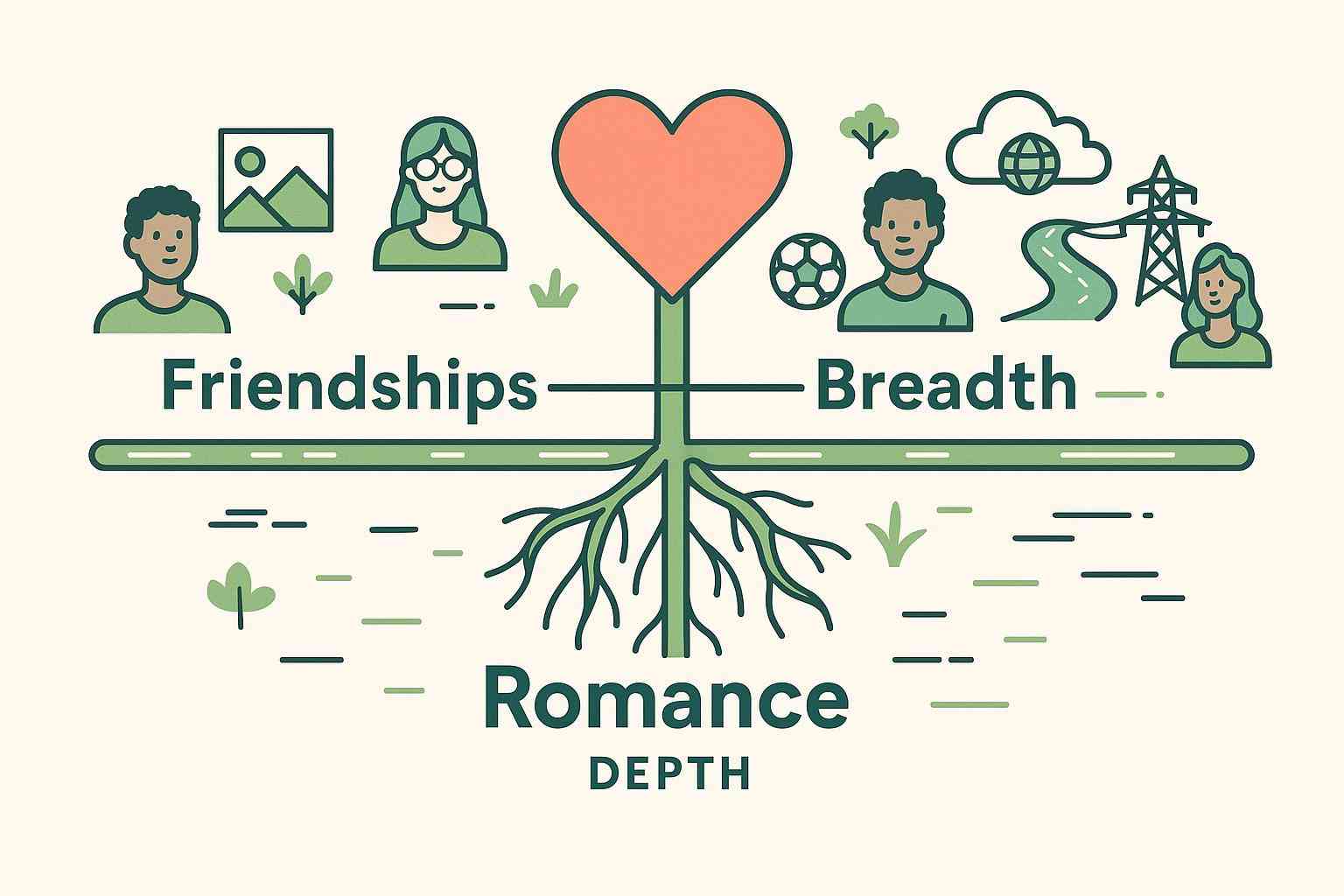Loneliness in a Relationship: Why Platonic Friends Matter (and How to Build Them)
Feeling lonely while in love doesn’t mean your relationship is broken. It means your heart has more rooms to furnish.
The myth that creates loneliness
I believed a lie for years. If you’re in a relationship but feel lonely, you might believe it too:
If our romance is strong, I’d never crave other connections.
If I ache for more, something must be wrong with us.
Here’s the truth: love can be real and vibrant, but still not meet every human need you have. That’s not a failure. That’s your nervous system asking for more kinds of connection.
A story that changed my mind
Two months ago, I met a management director from New York online. She’s been married ten years and had the kind of partnership people envy: still holding hands, finishing each other’s sentences. One night she sent a voice note:
I asked, “But you’re happy with him, aren’t you?” She sighed,
Treating romance as your only emotional lifeline is like building a mansion on sand. No matter how beautiful, without a foundation, it creaks.
- You might laugh with your partner and still crave someone who shares your niche passion.
- You can feel loved yet miss the friend who calls at midnight to say, “I saw this meme and thought of you.”
- You can have intimacy yet no one to vent to about your relationship.
Romance gives depth. Friendship gives breadth. One without the other leaves you emotionally malnourished.
Loneliness in a relationship vs. loneliness in marriage: what it really means
Loneliness in a relationship doesn’t automatically mean the relationship is wrong. Often, it means the relationship is trying to carry too much.
As one colleague told me:
Your partner isn’t designed to be your:
- Therapist
- Hobby squad
- Personal cheerleader
- Archive of inside jokes from college
That’s too heavy for one person to carry. When you diversify your support, you protect your relationship from overload.
Platonic friends are emotional infrastructure
Think of friendships as the roads, power lines, and bridges connecting you to the world. When they crumble, everything feels harder—even love.

Cultivating friendships isn’t betrayal. It’s maintenance. It keeps your emotional ecosystem resilient so you can show up to your relationship grounded, playful, and generous.
A step-by-step plan to build authentic friendships
1) Audit your emotional infrastructure
List the last three times you felt truly seen. How many involved your partner vs. others? Gaps aren’t failures. They’re blueprints.
2) Seek complementary connections, not clones
- Your partner hates hiking? Find a trail buddy.
- They glaze over when you talk AI ethics? Join a philosophy community or Discord.
- They’re not into pottery? Take that class you bookmarked.
3) Schedule friendship like a CEO
- Text an old friend now: “Miss you. Virtual coffee next week?”
- Join one recurring group (book club, run club, improv, volunteering). Consistency creates closeness.
- Say yes to low-stakes invites: the coworker’s rooftop BBQ, the neighbor’s game night.
4) Protect the ecosystem
- Keep some hangouts low stakes—no deep talks required.
- Maintain unshared interests—your partner doesn’t need to attend.
- Give guilt-free space—your love isn’t a jail.
 Build authentic friendships with Bubblic
Build authentic friendships with Bubblic
Match by shared interests and values without profile photos, send low-stakes voice messages, and foster deep connections with people around the world.
Get the appHow to talk to your partner about loneliness (without blame)
Use compassionate, forward-looking language:
- “I love us, and I’ve realized I need more friend time for play and venting. Investing in friendships will help me show up better with you.”
- “Can we protect one evening a week where we each do our own thing?”
- “If I’m sharing something best suited for a friend or therapist, can you flag it? I want to distribute the load better.”
Frequently asked questions
Is it normal to feel lonely in a relationship?
Yes. Loneliness in a relationship can exist alongside real love and commitment. It often points to missing breadth in your support network, not a broken bond.
What does loneliness in marriage look like?
It might look like missing a friend who shares your niche interests or feeling like your spouse is your only outlet for everything. That imbalance is solvable.
How do I make platonic friends as an adult?
Pick one interest, show up weekly in the same place, make one micro-invite, and follow up within 48 hours. Consistency beats intensity.
Will more friend time take away from my relationship?
Generally, no. When your needs are diversified, you bring more ease and joy home. Set expectations and protect couple time too.
What if my partner feels threatened?
Reassure them: this is about support, not replacement. Share your schedule, invite collaborative planning, and keep communication open.
The gentle signpost
Loneliness in love isn’t a red flag. It’s a signpost: your heart has more rooms to furnish. The most resilient relationships I know stand on a web of connections: book clubs that outlast breakups, gym buddies who notice your silence, Internet friends who listen to your 15-minute voice notes.
Nurture your friendships not despite your love, but because of it. When you’re held by many hands, you hold your lover’s more gently.